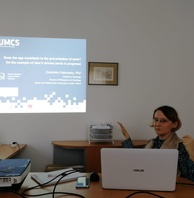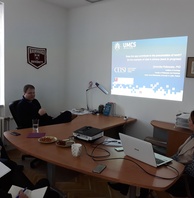Seminars
D. Polkowska: Does the app contribute to the precarization of work? On the example of Uber’s drivers

Feb. 15, 2019
We invite you to another CELSI Frontiers Seminar, with InGrid visiting researcher Dominika Polkowska, PhD on Does the app contribute to the precarization of work? On the example of Uber’s drivers.
InGRID-2 project: 4 year project by the European H2020-programme. The project provides transnational access to 16 European data centres of the infrastructure within a context of mutual knowledge exchange and cross-fertilisation.
Abstract:
Changes occurring in the labor relations caused by the expansion of platforms are connected, among others, with the possibility of remote provision of services, the development of flexible forms of employment (Drahokoupil and Fabo 2016), the increase in global labor supply and demand, changes in work organization (task work, network structures) (Hua and Ray 2018), however, if certain conditions arise, they may lead to precarious work (Adriaanse 2016). Among many different and often precluded definitions of precariat and precarious work (Rodgers and Rodgers 1989; Dörre, Kraemer, and Speidel 2006; Butler 2004; Barbier, Brygoo, and Viguier 2002; Vosko 2006; Standing 2011), the proposal of Arne Kalleberg deserves attention (Kalleberg 2014; Hewison and Kalleberg 2013; Kalleberg 2009)(Kalleberg 2009). He defines precariat work as uncertain (high risk of losing it, irregular working time distribution), unstable (limited social and financial privileges) and unsecured (low chances of promotion to better jobs). For the purposes of this study, I adopted the definition of precarious work, characterized by: a subjective sense of uncertainty (defined on the basis of the meaning given to it by the employee), lack of job security, long working hours, low income and lack of employee rights (social care and unions protection) (Bosmans et al. 2016; Lorey 2015). Therefore, the purpose of the study is to describe the individual experiences of Uber’s drivers in the context of precarious work, and to examine the impact of the online platform on the work of Uber´s drivers. The research problem concerns whether the way of work organization determined by the App is related to the subjective feeling of precarious work of drivers. For the purposes of this research, the main research question was formulated: how Uber´s drivers assess the impact of the platform on their work (fairness - allocation of courses, tensions between employees, mechanism of recommendations; autonomy, relations with Uber – as a contractor or employer; motivation, uncertainty, employment instability) in the context of precariat? To answer the research question, the qualitative research had been conducted among ten Uber’s full-time drivers in one of the Polish cities, using in-depth interviews (IDI) in November 2018. The scenario of the interview concerned 5 dimensions of job precarization: uncertainty, security, wages, working time, employee rights, and the impact of the Internet platform (App).
BIO:
Dominika Polkowska, PhD, is a sociologist, Assistant Professor in Department of Sociology, Maria Curie-Sklodowska University in Lublin, Poland. Her research interest focuses on the labour market issues with particular attention to precariat and precarious work and work through platform-based business models using sharing mechanisms. Recently, she has been conducting qualitative research on the impact of platform business models on precarization of work, on the example of Uber drivers. Selected publications: Polkowska, D. 2018. Od proletariatu do prekariatu. Ciągłość czy zmiana? Próba analizy, Prakseologia, 160: 41-67. Polkowska, D. 2017, The Feminisation of Precarity. Poland Compared to Other Countries, Annales. Ethics in Economic Life, 20 (8): 119-136; Polkowska, D. 2016. Precariat: Contemporary Face of Labour Relations, Warsaw Forum of Economic Sociology, 7:1(13): 27- 41; Polkowska, D. 2016. The “precarity trap” of Poland’s youth labour market: flexible employment a barrier or opportunity?, EMECON, 1/2016: 1-16; Polkowska, D. 2016. Work at home, home at work: difficulties in achieving work-life balance in selected European countries, Polish Sociological Review, 2: 191-208.
Seminar will take place on Friday, February 15 2019, at 14:00-15:00, at CELSI (Zvolenska 29, Bratislava).
Please RSVP to: ivana.gallasova@celsi.sk

